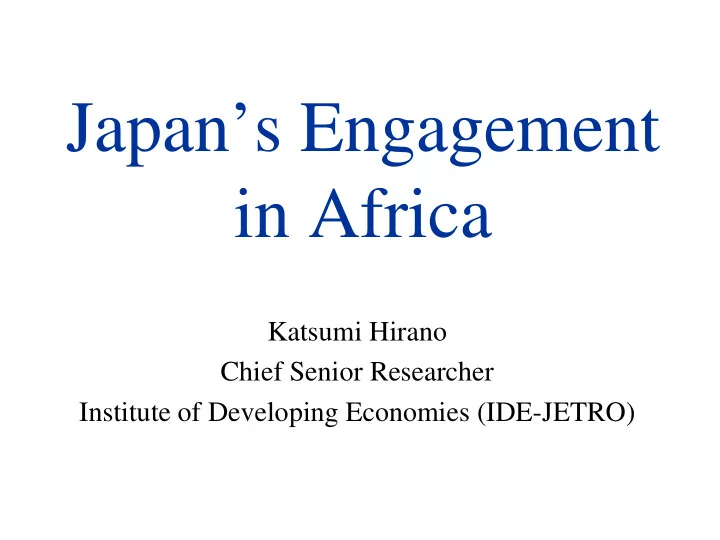

Japan’s Engagement in Africa Katsumi Hirano Chief Senior Researcher Institute of Developing Economies (IDE-JETRO)
Africa’s shares in Japanese trade Export to Africa 10% 8% 6% Import from Africa 4% Source: Japan Tariff Association Import from South Africa 2% Export to South Africa 0% 1965 1970 1975 1980 1985 1990 1995 2000 2005 2010
Main trade items between Africa and Japan sustained by automobile industry ($ billion) 14 Fuel import 12 10 8 Source: World Trade Atlas 6 4 Automobile export Platinum import 2 0 1994 1996 1998 2000 2002 2004 2006 2008 2010 2012
Post 3.11: Expansion of import from Africa fuel for electricity generation ($ million) 1400 1200 Natural gas, Nigeria 1000 Crude oil 800 Sudan Source: World Trade Atlas 600 Natural gas Equatorial Guinea 400 Crude oil, Gabon 200 0 Q1 Q2 Q3 Q4 Q1 Q2 Q3 Q4 Q1 Q2 Q3 Q4 Q1 Q2 Q3 Q4 2010 2011 2012 2013
Machineries’ export to Africa Japan and China ($ billion) China: electrical M China: general M 10 8 China: transport M 6 Source: World Trade Atlas Japan: transport M 4 Japan: general M 2 Japan: electrical M 0 1996 1998 2000 2002 2004 2006 2008 2010 2012
Cereal import: East Asia and Africa (million tons) Africa 70 60 East Asia 50 40 Japan 30 20 Sub-Saharan Africa 10 Source: FAOSTAT 0 1965 1970 1975 1980 1985 1990 1995 2000 2005 2010
Demographic bonus and onus Shares of working age population 75% China South Korea 70% China (UN estimates) 65% Japan 60% 55% Source: Statistics Japan, KOSIS, National Bureau of Statistics of China, UN 50% 1950 1960 1970 1980 1990 2000 2010 2020
Our requirements to Africa • Stable resource supplier • Food security in global dimension • These requirements are commonly observed in East Asia; Japan, China, South Korea • East Asian countries share similarities in economic thought, aid policy and its priority • Japan will be able to understand well China’s Africa policy, which seemingly referred to Japan’s economic cooperation policy in Asia
East Asia’s destiny • Global center of manufacturing, who has the biggest demand for resources • Region-wide collaboration be most desirable and productive even in Africa policy • But, East Asia is divided by political confrontation brought by combative nationalism
Recommend
More recommend